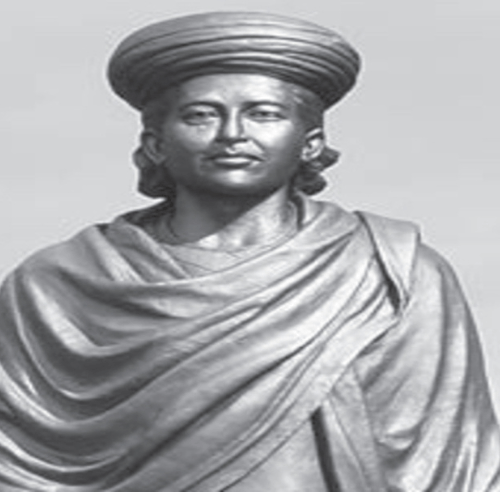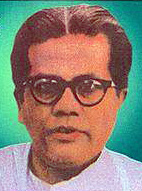Introduction
Anandaram Dhekial Phukan, a name that resonates deeply in Assamese History, was one of the most influential figures in the Arunodoi era of Assamese literature. Born on September 24, 1829, in Guwahati, into the renowned “Dhekial Phukan” family, his contributions played a crucial role in revitalizing Assamese literature at a time when it was facing immense challenges. Despite living only 30 years, his literary and linguistic efforts left an indelible mark on Assam’s cultural heritage.
Early Life and Education
Anandaram Dhekial Phukan began his education in Guwahati, where he demonstrated a keen interest in literature and learning. His father’s close association with Commissioner Jenkins paved the way for Anandaram to pursue higher education in Calcutta at Hindu College. After spending three years there, he returned to Guwahati and continued his studies under Mr. Blend, an English tutor. He also expanded his linguistic knowledge by studying Sanskrit and Urdu, which later influenced his literary works.
Professional Journey and Contributions
In 1846, at the age of 17, Anandaram got married and soon after joined government service in 1847. Throughout his career, he held several important positions, including Dewan of the King of Bijani, Munsif, and Junior Assistant Commissioner. His government service provided him with firsthand experience of the socio-political landscape, which he later reflected in his literary and linguistic works.
Literary Contributions and the Revival of Assamese Language
Anandaram Dhekial Phukan actively participated in the literary movement initiated by Christian missionaries through the Arunodoi magazine. His commitment to Assamese literature was evident in the numerous publications he authored:
1. Englandar Biwaran (1847)
This book, published in Arunodoi, provided a description of England and its culture, offering Assamese readers a glimpse into the Western world. At a time when Assam was under British rule, this work was instrumental in broadening the perspectives of the Assamese people.
2. Asomiya Lorar Mitra (1849)
One of his most significant works, Asomiya Lorar Mitra (Assamese Children’s Friend), was published in two volumes, consisting of nearly 400 pages. This book is considered a milestone in Assamese literature, as it aimed to educate and nurture young minds by providing valuable knowledge in the Assamese language.
3. A Few Remarks on Assamese Language (1855)
This English-language publication was groundbreaking in its defense of the Assamese language. In this book, Anandaram highlighted the distinct identity of Assamese and strongly opposed the imposition of Bengali as the official language in Assam. He emphasized the importance of preserving Assamese as an independent language and its rich literary traditions. The book also referenced 62 religious texts and 40 plays, showcasing the depth of Assamese literary heritage.
4. Dictionaries in Assamese and English
Anandaram also started working on two dictionaries—Assamese to English and English to Assamese. Although he could not complete them, he managed to send portions of these works to Arunodoi. These efforts were crucial in establishing Assamese as a language of learning and communication.
The Arunodoi Age and His Role
The Arunodoi era marked a significant turning point in Assamese literature. Anandaram Dhekial Phukan, along with Nathan Brown, Miles Bronson, Levi Nidhi, Gunabhiram Barua, and Hem Chandra Barua, played a crucial role in shaping this period. They worked tirelessly to promote Assamese literature, preserve its linguistic identity, and resist the external influences that threatened its existence.
Impact and Legacy
Despite his untimely death in June 1859 at the young age of 30, Anandaram Dhekial Phukan’s contributions to Assamese literature and language remain invaluable. His literary works not only enriched Assamese literature but also laid the foundation for future scholars and writers to build upon.
His unwavering efforts in advocating for the Assamese language played a pivotal role in preventing its decline. His arguments against the imposition of Bengali as the official language contributed to later movements that successfully reinstated Assamese as a distinct and independent language of administration and literature.
Conclusion
Anandaram Dhekial Phukan’s life, though short, was filled with groundbreaking literary and linguistic achievements. His passion for Assamese literature, dedication to its revival, and relentless pursuit of linguistic justice make him a revered figure in Assam’s history. Today, his works continue to inspire students, scholars, and literary enthusiasts who appreciate the rich heritage of Assamese language and culture.
FAQ’s:
Q 1. Who was Anandaram Dhekial Phukan?
Anandaram Dhekial Phukan was a prominent Assamese writer and social reformer born in 1829. He played a crucial role in the revival of Assamese literature during the Arunodoi era and strongly advocated for the recognition of the Assamese language.
Q 2. What were Anandaram Dhekial Phukan’s major contributions to Assamese literature?
He wrote several influential books, including Englandar Biwaran, Asomiya Lorar Mitra, and A Few Remarks on Assamese Language. He also started working on Assamese-English and English-Assamese dictionaries, contributing significantly to Assamese linguistic development.
Q 3. Why is Anandaram Dhekial Phukan considered a pioneer of Assamese literature?
During a time when Assamese literature was declining due to the imposition of Bengali as the official language, he actively worked to restore its identity. His writings and advocacy helped shape modern Assamese literature.
Q 4. What was the book A Few Remarks on Assamese Language about?
This book, published in 1855, argued that Assamese is a distinct and independent language, not a dialect of Bengali. He strongly opposed the imposition of Bengali in Assam and provided evidence to support the richness of Assamese literature.
Q 5. How did Anandaram Dhekial Phukan contribute to Assamese education?
He authored Asomiya Lorar Mitra, a two-volume book for children, which played a significant role in educating young Assamese readers. His works aimed to make learning accessible and strengthen the Assamese language.
Q 6. What was the significance of the Arunodoi era in Assamese literature?
The Arunodoi era was a literary movement in Assam led by Christian missionaries and Assamese intellectuals. Anandaram Dhekial Phukan, along with others, contributed by writing and publishing works that revived Assamese literature and culture.
Q 7. Why did Anandaram Dhekial Phukan oppose Bengali as Assam’s official language?
He believed that Assamese had a rich literary history and should not be overshadowed by Bengali. His book A Few Remarks on Assamese Language explained how imposing Bengali would harm the growth of Assamese literature and education.
Q 8. What positions did Anandaram Dhekial Phukan hold in his professional life?
He worked in various government roles, including Dewan of the King of Bijani, Munsif, and Junior Assistant Commissioner. These positions allowed him to observe the socio-political landscape and advocate for Assamese language rights.
Q 9. What impact did Anandaram Dhekial Phukan have on Assamese literature today?
His efforts laid the foundation for the recognition and preservation of Assamese as an independent language. Many later writers and scholars built upon his contributions, ensuring Assamese literature’s growth and survival.
Q 10. When did Anandaram Dhekial Phukan pass away, and what was his age?
He passed away in June 1859 at the young age of 30. Despite his short life, his influence on Assamese literature and language remains significant.












